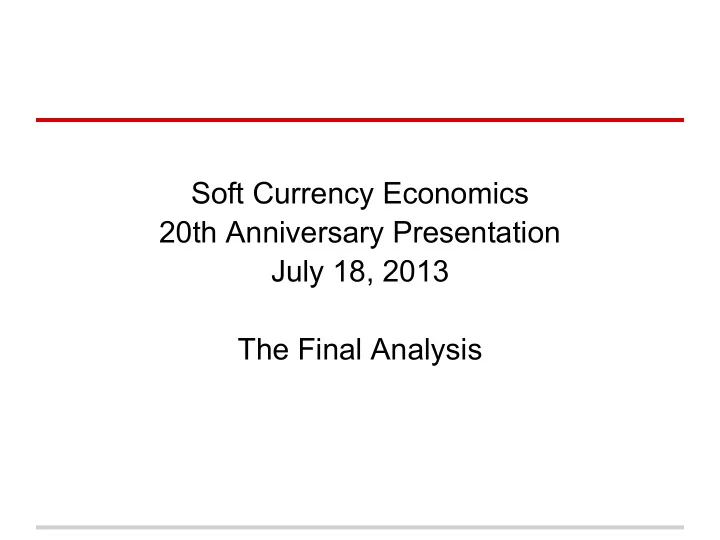

Soft Currency Economics 20th Anniversary Presentation July 18, 2013 The Final Analysis
Brief History ● 1971 to 1997 ● Italy 1993 ● Columbia debate
Fundamentals ● The dollar is a simple public monopoly ● There can't be a reserve drain without a reserve add ● Exports are real costs and imports real benefits
Exchange Rate Policy ● Fixed fx- necessarily reserve constrained ● Floating fx- never reserve constrained ● Fixed fx- rates market determined ● Floating fx- CB set rates ● Investment vehicle vs policy tool ● Euro is floating, with national governments like US states
Congress Isn't Revenue Constrained ● Taxes function to create notional demand ● Govt. spending functions to satisfy that demand ● Treasury securities function to support rates
Monetary Operations ● Govt. spending credits reserve accounts ● Taxing debits reserve accounts ● Selling Treasury securities debits reserve accounts and credits securities accounts ● At maturity the Fed debits securities accounts and credits reserve accounts.
Unemployment is a Monetary Phenomenon ● When a monopolist restricts supply the evidence is excess capacity ● Unemployment is the evidence that govt. hasn't spent enough to cover the tax bill and residual desires to net save financial assets ● Unemployment is the evidence the unemployment created by taxation exceeds the employment funded by govt. spending
Quantitative Easing ● Purchases drive prices to indifference levels ● The Fed debits securities accounts and credits reserve accounts ● Net financial assets remain unchanged ● The economy forgoes interest income
Jobs and GDP
Retail Sales Control Group
US Exports
Industrial Production
Accounting Identities ● Govt. deficit = non govt. net financial assets ● For a given GDP, unspent income has been offset by deficit spending ● Savings is the accounting record of investment ● Loans create deposits and any required reserves
Automatic Fiscal Stabilizers ● GDP growth increases revenues and decreases transfer payments ● GDP contraction reduces revenues and increases transfer payments
Austerity! ● Jan 1 tax hikes ● April 1 sequesters
The Fiscal Cycle ● Assume last year's GDP was $16 trillion ● For every agent that spent less than his income another spent more than his income ● So any cut in govt. net spending reduces GDP unless other agents increase their net (deficit) spending ● The automatic fiscal stabilizers reduce govt. deficit spending as private sector credit expands to fund growth ● This is an unsustainable process
History the Way I See It ● The expansion phase of the sub prime fiasco supported the Bush expansion ● The private sector borrowing to fuel the .com and y2k boom drove the Clinton expansion ● The expansion phase of the S and L crisis drove the Reagan years ● The emerging markets credit expansion drove the 70's ● Without those 'regrettable' factors those years would have looked more like today.
How I See the US Economy Today ● All the indicators are decelerating or going sideways, including GDP ● Private sector credit is not expanding fast enough to offset the proactive and continuing reduction in net govt. spending ● The risk is that if the govt. deficit isn't large enough to sufficiently support the rest of the credit structure, the automatic stabilizers will go into reverse until the govt. deficit is sufficient to stop the slide
Prospects for The US Economy ● Is it possible that private sector credit demand will rise to the occasion? ● Yes, but I see no signs of it happening ● Is it possible that net exports could rise to the occasion? ● Yes, but they look to be slowing to me ● QE is a tax, however market participants view it as support for equities, and have thereby created an 'asset bubble'
Investment Strategy ● If I'm right, short term rates will remain well anchored, and longer term rates will fall dramatically. ● So buy 30 year 0 coupon Treasury securities ● But I might be wrong ● So received fixed on a 30 year BMA swap at 91% of 3 month libor vs paying weekly sifma ● This all but locks in a 3.75% alpha for 30 years, unleveraged, with massive positive convexity on both sides :)
ME-MMT Proposals ● Full FICA suspension to increase sales/output/employment and reduce costs ● Fund a fixed wage transition job for anyone willing and able to work ● Announce a permanent 0 rate policy ● Restrict Treasury to 3 month bills ● Allow unlimited campaign donations with 40% going to the opposition ● Replace transactions taxes with asset taxes when applicable
ME-MMT Healthcare Proposal ● Healthcare should not be a marginal cost of production ● Have the Federal govt. give everyone over 17 years old 5,000/year for healthcare. ● 1,000 for preventative and 4,000 for all other health care needs ● All needs above 4,000 are fully covered by Medicare, no co pays, no donut holes ● If less then 4,000 is spent, the difference is refunded at year end ● The accounts are 'topped off' on Jan 1.
ME-MMT Banking Proposals ● Limit member bank activity to approved lending and servicing depositors ● Remove limits on FDIC insurance ● Allow all member banks unlimited Fed funding at the policy rate ● Prohibit member banks from all secondary market activity ● Prohibit financial assets as collateral ● Limit member bank assets to regulated loans supported by credit analysis and reserves
On Trade ● Exports are real costs, imports real benefits ● Public purpose is served by optimizing real terms of trade
Two Words on Tarp regulatory forbearance
Inflation ● The currency is a public monopoly ● A monopolist sets two rates ● The 'own rate' is an interest rate ● The price level is a function of prices paid by govt. when it spends, and/or collateral demanded when it lends.
Comment on the Federal Deficit It's just reserve drain, get over it!!!
Recommend
More recommend